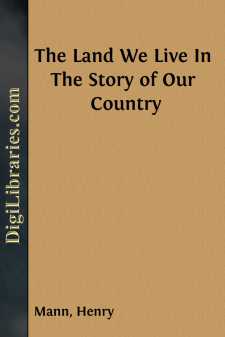Categories
- Antiques & Collectibles 13
- Architecture 36
- Art 48
- Bibles 22
- Biography & Autobiography 813
- Body, Mind & Spirit 142
- Business & Economics 28
- Children's Books 17
- Children's Fiction 14
- Computers 4
- Cooking 94
- Crafts & Hobbies 4
- Drama 346
- Education 46
- Family & Relationships 57
- Fiction 11829
- Games 19
- Gardening 17
- Health & Fitness 34
- History 1377
- House & Home 1
- Humor 147
- Juvenile Fiction 1873
- Juvenile Nonfiction 202
- Language Arts & Disciplines 88
- Law 16
- Literary Collections 686
- Literary Criticism 179
- Mathematics 13
- Medical 41
- Music 40
- Nature 179
- Non-Classifiable 1768
- Performing Arts 7
- Periodicals 1453
- Philosophy 64
- Photography 2
- Poetry 896
- Political Science 203
- Psychology 42
- Reference 154
- Religion 513
- Science 126
- Self-Help 84
- Social Science 81
- Sports & Recreation 34
- Study Aids 3
- Technology & Engineering 59
- Transportation 23
- Travel 463
- True Crime 29
The Land We Live In The Story of Our Country
by: Henry Mann
Categories:
Description:
Excerpt
INTRODUCTION.
"The Story of Our Country" has been often told, but cannot be told too often. I have spared no effort to make the following pages interesting as well as truthful, and to present, in graphic language, a pen-picture of our nation's origin and progress. It is a story of events, and not a dry chronicle of official succession. It is an attempt to give some fresh color to facts that are well known, while depicting also other facts of public interest which have never appeared in any general history. Wherever I have taken the work of another I give credit therefor; otherwise this little book is the fruit of original research and thought. The views expressed will doubtless not please everybody, and some may think that I go too far in pleading the cause of the original natives of the soil. Historic justice demands that some one should tell the truth about the Indians, whose chief and almost only fault has been that they occupied lands which the white man wanted. Even now covetous eyes are cast upon the territory reserved for the use of the remaining tribes.
For such statements in regard to General Jackson at New Orleans as differ from the ordinary narrative I am indebted to a work never published, so far as I am aware, in this country or in the English language—Vincent Nolte's "Fifty Years in Both Hemispheres," issued in Hamburg in 1853. As Nolte owned the cotton which Jackson appropriated, and also served as a volunteer in the battle of New Orleans, he ought to be good authority.
In dealing with the late war I have sought to be just to both the Union and the Confederacy. The lapse of over thirty years has given a more accurate perspective to the events of that mighty struggle, in which, as a soldier-boy of sixteen, I was an obscure participant, and all true Americans, whether they wore the blue or gray, now look back with pride to the splendid valor and heroic endurance displayed by the combatants on both sides. Those who belittle the constancy and courage of the South belittle the sacrifices and successes of the North.
The slavery conflict has long been over, and the scars it left are disappearing. Other and momentous problems have arisen for settlement, but there is every reason for confidence that they will be settled at the ballot-box, and without appeal to rebellion, or thought or threat of secession. In the present generation, more than in any preceding, is the injunction of Washington exemplified, that the name of American should always exalt the just pride of patriotism, more than any appellation derived from local discriminations. This supreme National sentiment overpowering all considerations of local interest and attachment, is the assurance that our country will live forever, that all difficulties, however menacing, will yield to the challenge of popular intelligence and patriotism, and that the glorious record of the past is but the morning ray of our National greatness to come.
Henry Mann.
FIRST PERIOD.
The Foothold.
PAGE.
...

